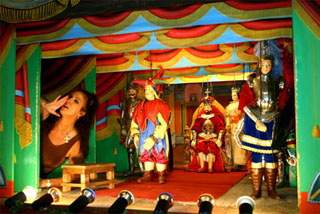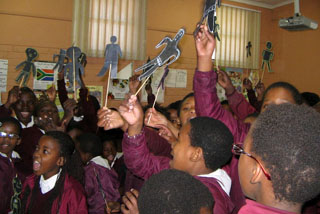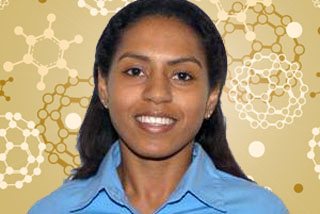|
National Science Week gets Italian flavour
Until the advent of UNAWE there were no large-scale attempts to use astronomy as a tool for inspiring and educating young children. The programme is aimed at children aged 4 to 10 years, especially those from underprivileged communities. Drawing on the Universe to inspire children The vision of UNAWE is to use the beauty and grandeur of the Universe to inspire young children and encourage them to develop an interest in science and technology. The programme also aims to introduce children to the idea of global citizenship and tolerance at a crucial stage of their development - to show them that they are part of an international community. The exchange visit provided opportunities for learners and educators to develop and improve their knowledge of science, and astronomy in particular. Educators improved their teaching methods, while students learnt in an interactive and fun-filled manner, in line with the national school curriculum. Activities in the Western Cape kicked off with a question-and-answer session facilitated by Zimbabwean astrophysicist Dr Shazrene Mohamed, currently a research fellow at the South African Astronomical Observatory (SAAO). The session with Shazrene gave learners the opportunity to debunk any myths they might have come across in astronomy. As a female astronomer, Shazrene helped to dispel the widespread notion that astronomers are all male, hopefully inspiring some of the almost 300 girl learners in attendance to follow a career in astronomy. Italian puppet theatre techniques Learners were then invited to a planetarium show - their first time ever inside a planetarium. During the show they observed the southern sky and some of the most famous constellations (Crux, Orion and Scorpio). Using Italian puppet theatre techniques and myths collected by the UNAWE South Africa team, the children were taught about the sky in an immersive way. They learned how to find the constellations, what the best time is to see them, and the differences between the sky in the Northern and Southern hemispheres. Before the show most of the children could not answer simple astronomy-related questions such as "what is a star?" or "what is a constellation?", but by the end the vast majority could describe a star and name at least the Orion constellation. Twenty South African educators took part in a live video link with the Italian Zafferana Etnea School in Sicily. Two educators and the principal of the Italian school joined the South Africans for a lively debate and formed a bond that will continue during the 2013 academic year, with collaborative projects already being planned. The exchange visit between Italy and South Africa was a resounding success. In just a week the project helped to renew South Africa's interest in teaching and learning about astronomy and space science. This led to EU-UNAWE projects being proposed as part of the programmes in the Western Cape area for the next academic year. Read more about Dutch and South African learners collaborating in a project to observe the moon for a full month, as well as a multi-cultural astronomy fun day for German and South African children on the UNAWE website. The South African project manager of EU-UNAWE is Troshini Naidoo, who is based at SAAO. Information courtesy of UNAWE |


